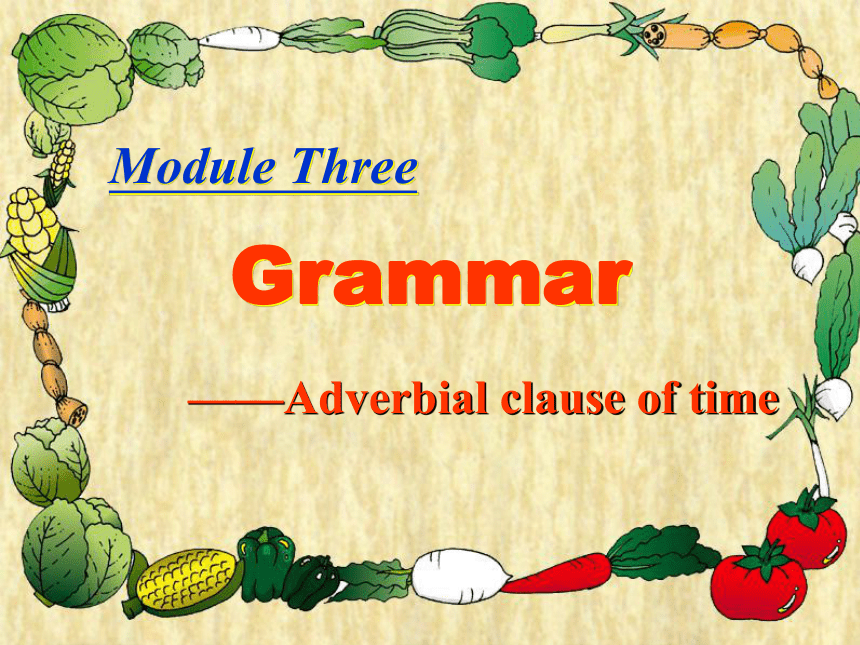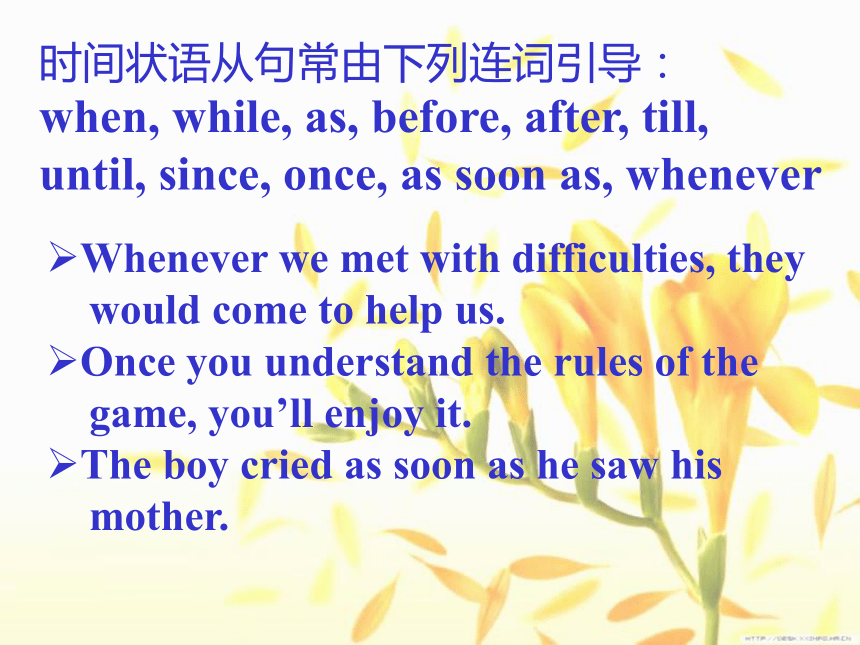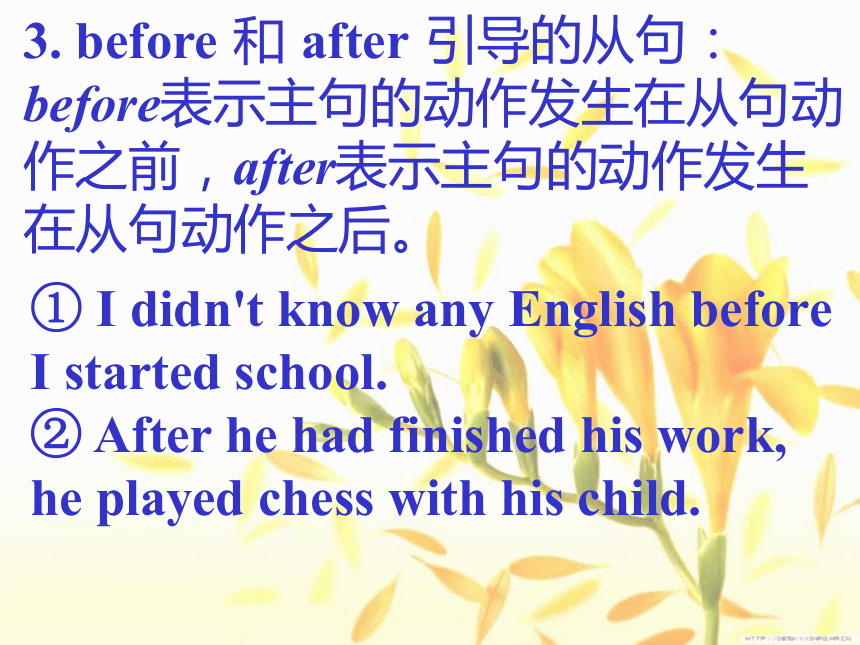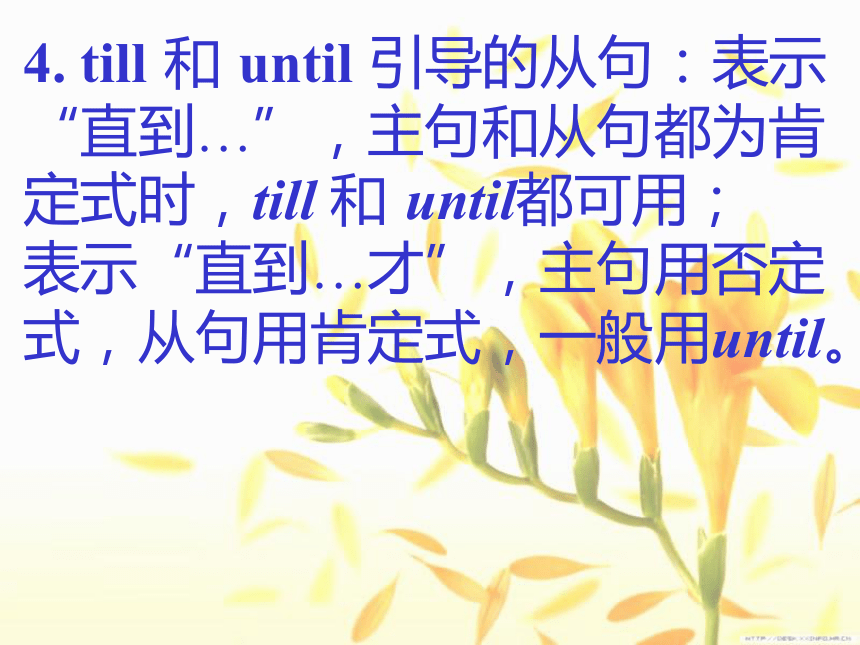Module 3 Music Adverbial clause of time 语法课件
文档属性
| 名称 | Module 3 Music Adverbial clause of time 语法课件 |

|
|
| 格式 | rar | ||
| 文件大小 | 146.1KB | ||
| 资源类型 | 教案 | ||
| 版本资源 | 外研版 | ||
| 科目 | 英语 | ||
| 更新时间 | 2009-07-19 00:00:00 | ||
图片预览







文档简介
课件17张PPT。GrammarModule Three——Adverbial clause of time时间状语从句常由下列连词引导:
when, while, as, before, after, till,
until, since, once, as soon as, wheneverWhenever we met with difficulties, they would come to help us.
Once you understand the rules of the game, you’ll enjoy it.
The boy cried as soon as he saw his mother.when 和 whenever 引导的从句:从句的动作和主句的动作可以同时发生,也可以先于主句的动作而发生。When we got home, it was already dark.
I thought of it just when you opened your mouth.When 从句中的动词既可以是短暂动词,也可以是延续动词。而while从句中的动词只能 是延续性动词。
He took a bath while I was watching TV.2. while 和 as 引导的从句:while 表示“当…时”,从句中的动词常用进行时态,强调某一段时间内主句和从句的动作在同时发生。As 表示“在…过程中”或“一边…一边…”,主句和从句的动作同时发生。While we were cleaning the windows, they were sweeping the floor.3. before 和 after 引导的从句: before表示主句的动作发生在从句动作之前,after表示主句的动作发生在从句动作之后。① I didn't know any English before I started school.
② After he had finished his work, he played chess with his child.4. till 和 until 引导的从句:表示“直到…”,主句和从句都为肯定式时,till 和 until都可用; 表示“直到…才”,主句用否定式,从句用肯定式,一般用until。① They worked till/until it was midnight.
② They were so excited that they didn't fall asleep until it was almost dawn.
③ Not until I shouted at the top of my voice did they become quiet.5. since 和 ever since 引导的从句:表示“自从…以来”,从句一般表示动作的起点,用过去时; 主句表示动作延续的情况,一般用现在完成时或现在完成进行时。如果主句表示的是时间,主句可用一般现在时,也可用现在完成时。① Since he came here, he has made a lot of friends.
② He has been working here ever since he left university.
③ It is/has been 20 years since I started to learn English.5.一些表示时间的名词词组或副词 也用作连词,引导时间状语句。
the moment, the minute, each time, early time, the first time, the last time, by the time, next time, directly,immediately, I’ll tell you about it the moment you come.
I recognized her directly I saw her.
I’m going to see him next time he comes to Shanghai.
I got in touch with him immediately I received his letter.
The first time I saw him, he was working in a factory.hardly……when, no sooner……than 一…就…, 刚…就…。主句用过去完成时。 We had hardly begun when they asked us to stop.
We had no sooner begun than they asked us to stop.
Hardly had I got home when it began to rain.
No sooner had I got home than it began to rain. before long / long before :
1. before long (= soon; by and by) 不久以后,
(与过去时或将来时连用)
long before/ago 很久以前, (常与过去时连用)
It be + 时间 + before 从句
(1) The book will be published before long/soon.
(2) They left the city before long/soon.
(3) He had left his homeland long before liberation.
(4) It was (not) long before they reached the village.
(5) It won’t be long before we meet again.
It is long before… 很久才…
It won’t be long before… 不久就 …考题: ____ he will return to his native land.
A. It is long before that
B. It is before long that
C. It won’t be long before
D. It will be before long thatB1.我们到这个城市很久之前, 彼此就认识.
2.我希望不久后再见到你.
3.他们早就把工作完了.
We had known each other long before
we came to this city. I hope I will meet you again before long/soon.They (had) finished the work long before/ago.不把before 译成“在… 之前”的用法
1.It was long before he came.
2.He went away before I had time
to reply.
3.Prove an idea before he was ready
to accept it.
4.I had not waited long before she came.
5.They had not been married a month
before they quarrelled. 才就才就就1.I had been waiting __ before Joan
arrived. A. some time B. sometime
C. some times D. sometimes
2.Mind where you are going __a car
hits you.
A. while B. when C. after D. before
Write down the phone number ___
you forget it.
3.Shake the medicine well__you take it.
A. when C. while D. before
You must examine your test paper
well __ you hand it in.AD 以免D再
when, while, as, before, after, till,
until, since, once, as soon as, wheneverWhenever we met with difficulties, they would come to help us.
Once you understand the rules of the game, you’ll enjoy it.
The boy cried as soon as he saw his mother.when 和 whenever 引导的从句:从句的动作和主句的动作可以同时发生,也可以先于主句的动作而发生。When we got home, it was already dark.
I thought of it just when you opened your mouth.When 从句中的动词既可以是短暂动词,也可以是延续动词。而while从句中的动词只能 是延续性动词。
He took a bath while I was watching TV.2. while 和 as 引导的从句:while 表示“当…时”,从句中的动词常用进行时态,强调某一段时间内主句和从句的动作在同时发生。As 表示“在…过程中”或“一边…一边…”,主句和从句的动作同时发生。While we were cleaning the windows, they were sweeping the floor.3. before 和 after 引导的从句: before表示主句的动作发生在从句动作之前,after表示主句的动作发生在从句动作之后。① I didn't know any English before I started school.
② After he had finished his work, he played chess with his child.4. till 和 until 引导的从句:表示“直到…”,主句和从句都为肯定式时,till 和 until都可用; 表示“直到…才”,主句用否定式,从句用肯定式,一般用until。① They worked till/until it was midnight.
② They were so excited that they didn't fall asleep until it was almost dawn.
③ Not until I shouted at the top of my voice did they become quiet.5. since 和 ever since 引导的从句:表示“自从…以来”,从句一般表示动作的起点,用过去时; 主句表示动作延续的情况,一般用现在完成时或现在完成进行时。如果主句表示的是时间,主句可用一般现在时,也可用现在完成时。① Since he came here, he has made a lot of friends.
② He has been working here ever since he left university.
③ It is/has been 20 years since I started to learn English.5.一些表示时间的名词词组或副词 也用作连词,引导时间状语句。
the moment, the minute, each time, early time, the first time, the last time, by the time, next time, directly,immediately, I’ll tell you about it the moment you come.
I recognized her directly I saw her.
I’m going to see him next time he comes to Shanghai.
I got in touch with him immediately I received his letter.
The first time I saw him, he was working in a factory.hardly……when, no sooner……than 一…就…, 刚…就…。主句用过去完成时。 We had hardly begun when they asked us to stop.
We had no sooner begun than they asked us to stop.
Hardly had I got home when it began to rain.
No sooner had I got home than it began to rain. before long / long before :
1. before long (= soon; by and by) 不久以后,
(与过去时或将来时连用)
long before/ago 很久以前, (常与过去时连用)
It be + 时间 + before 从句
(1) The book will be published before long/soon.
(2) They left the city before long/soon.
(3) He had left his homeland long before liberation.
(4) It was (not) long before they reached the village.
(5) It won’t be long before we meet again.
It is long before… 很久才…
It won’t be long before… 不久就 …考题: ____ he will return to his native land.
A. It is long before that
B. It is before long that
C. It won’t be long before
D. It will be before long thatB1.我们到这个城市很久之前, 彼此就认识.
2.我希望不久后再见到你.
3.他们早就把工作完了.
We had known each other long before
we came to this city. I hope I will meet you again before long/soon.They (had) finished the work long before/ago.不把before 译成“在… 之前”的用法
1.It was long before he came.
2.He went away before I had time
to reply.
3.Prove an idea before he was ready
to accept it.
4.I had not waited long before she came.
5.They had not been married a month
before they quarrelled. 才就才就就1.I had been waiting __ before Joan
arrived. A. some time B. sometime
C. some times D. sometimes
2.Mind where you are going __a car
hits you.
A. while B. when C. after D. before
Write down the phone number ___
you forget it.
3.Shake the medicine well__you take it.
A. when C. while D. before
You must examine your test paper
well __ you hand it in.AD 以免D再
